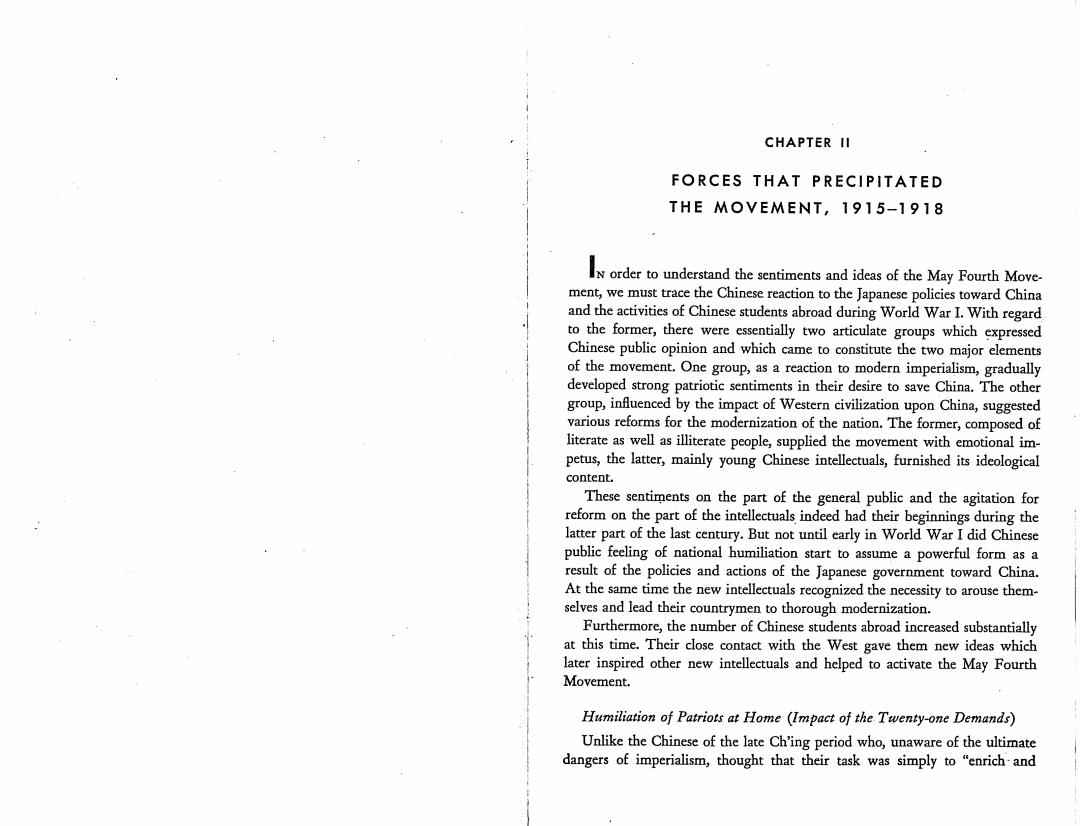
CHAPTER II FORCES THAT PRECIPITATED THE MOVEMENT,1915-1918 IN order to understand the sentiments and ideas of the May Fourth Move- ment,we must trace the Chinese reaction to the Japanese policies toward China and the activities of Chinese students abroad during World War I.With regard to the former,there were essentially two articulate groups which expressed Chinese public opinion and which came to constitute the two major elements of the movement.One group,as a reaction to modern imperialism,gradually developed strong patriotic sentiments in their desire to save China.The other group,influenced by the impact of Western civilization upon China,suggested various reforms for the modernization of the nation.The former,composed of literate as well as illiterate people,supplied the movement with emotional im- petus,the latter,mainly young Chinese intellectuals,furnished its ideological content. These sentiments on the part of the general public and the agitation for reform on the part of the intellectuals indeed had their beginnings during the latter part of the last century.But not until early in World War I did Chinese public feeling of national humiliation start to assume a powerful form as a result of the policies and actions of the Japanese government toward China. At the same time the new intellectuals recognized the necessity to arouse them- selves and lead their countrymen to thorough modernization. Furthermore,the number of Chinese students abroad increased substantially at this time.Their close contact with the West gave them new ideas which later inspired other new intellectuals and helped to activate the May Fourth Movement. Humiliation of Patriots at Home (Impact of the Twenty-one Demands) Unlike the Chinese of the late Ch'ing period who,unaware of the ultimate dangers of imperialism,thought that their task was simply to "enrichand
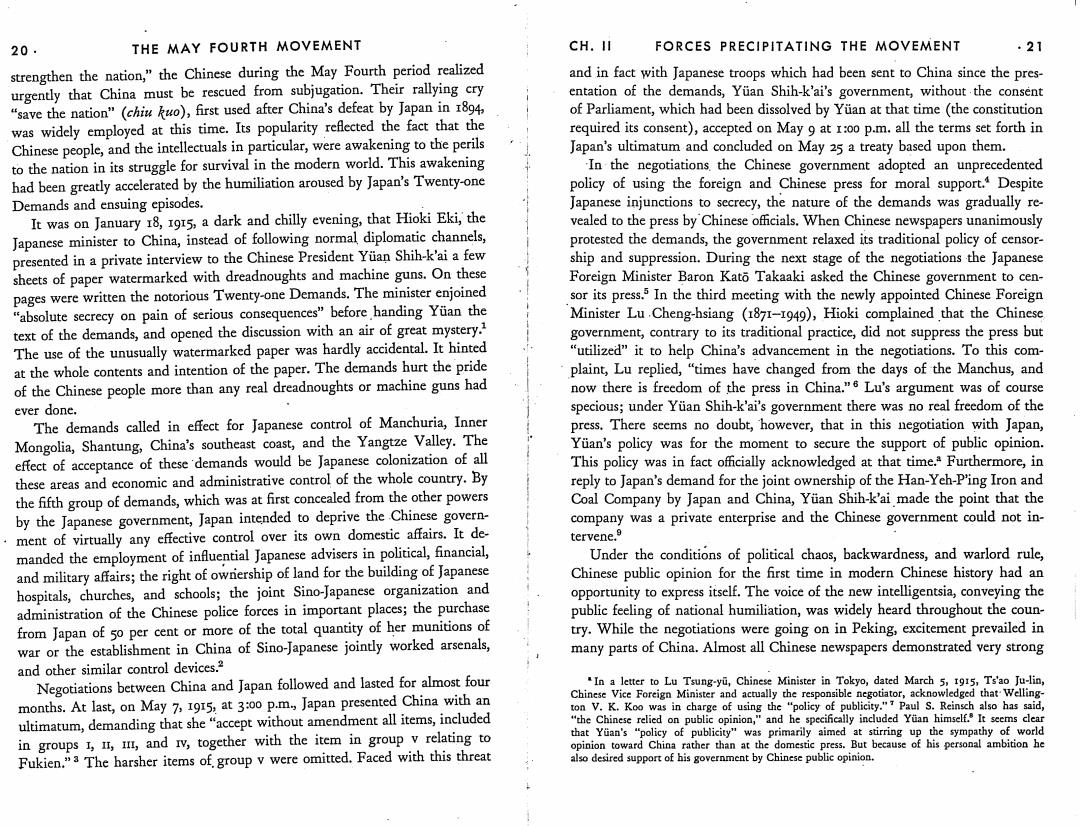
20. THE MAY FOURTH MOVEMENT CH.II FORCES PRECIPITATING THE MOVEMENT ·21 strengthen the nation,"the Chinese during the May Fourth period realized and in fact with Japanese troops which had been sent to China since the pres- urgently that China must be rescued from subjugation.Their rallying cry entation of the demands,Yuan Shih-k'ai's government,without the consent "save the nation"(chiuo),first used after China's defeat by Japan in 84 of Parliament,which had been dissolved by Yuan at that time(the constitution was widely employed at this time.Its popularity reflected the fact that the required its consent),accepted on May 9 at o p.m.all the terms set forth in Chinese people,and the intellectuals in particular,were awakening to the perils Japan's ultimatum and concluded on May 25 a treaty based upon them. to the nation in its struggle for survival in the modern world.This awakening In the negotiations.the Chinese government adopted an unprecedented had been greatly accelerated by the humiliation aroused by Japan's Twenty-one policy of using the foreign and Chinese press for moral support.Despite Demands and ensuing episodes. Japanese injunctions to secrecy,the nature of the demands was gradually re- It was on January 18,195,a dark and chilly evening,that Hioki Eki,the vealed to the press by Chinese officials.When Chinese newspapers unanimously Japanese minister to China,instead of following normal diplomatic channels, protested the demands,the government relaxed its traditional policy of censor- presented in a private interview to the Chinese President Yuan Shih-k'ai a few ship and suppression.During the next stage of the negotiations the Japanese sheets of paper watermarked with dreadnoughts and machine guns.On these Foreign Minister Baron Kato Takaaki asked the Chinese government to cen- pages were written the notorious Twenty-one Demands.The minister enjoined sor its press.5 In the third meeting with the newly appointed Chinese Foreign "absolute secrecy on pain of serious consequences"before handing Yian the Minister Lu Cheng-hsiang (1871-1949),Hioki complained that the Chinese text of the demands,and opened the discussion with an air of great mystery. government,contrary to its traditional practice,did not suppress the press but The use of the unusually watermarked paper was hardly accidental.It hinted "utilized"it to help China's advancement in the negotiations.To this com- at the whole contents and intention of the paper.The demands hurt the pride plaint,Lu replied,"times have changed from the days of the Manchus,and of the Chinese people more than any real dreadnoughts or machine guns had now there is freedom of the press in China."Lu's argument was of course ever done. specious;under Yuan Shih-k'ai's government there was no real freedom of the The demands called in effect for Japanese control of Manchuria,Inner press.There seems no doubt,however,that in this negotiation with Japan, Mongolia,Shantung,China's southeast coast,and the Yangtze Valley.The Yian's policy was for the moment to secure the support of public opinion. effect of acceptance of these'demands would be Japanese colonization of all This policy was in fact officially acknowledged at that time.Furthermore,in these areas and economic and administrative control of the whole country.By reply to Japan's demand for the joint ownership of the Han-Yeh-P'ing Iron and the fifth group of demands,which was at first concealed from the other powers Coal Company by Japan and China,Yuian Shih-k'ai made the point that the by the Japanese government,Japan intended to deprive the Chinese govern- company was a private enterprise and the Chinese government could not in- ment of virtually any effective control over its own domestic affairs.It de- tervene.9 manded the employment of influential Japanese advisers in political,financial, Under the conditions of political chaos,backwardness,and warlord rule, and military affairs;the right of owrership of land for the building of Japanese Chinese public opinion for the first time in modern Chinese history had an hospitals,churches,and schools;the joint Sino-Japanese organization and opportunity to express itself.The voice of the new intelligentsia,conveying the administration of the Chinese police forces in important places;the purchase public feeling of national humiliation,was widely heard throughout the coun- from Japan of 50 per cent or more of the total quantity of her munitions of try.While the negotiations were going on in Peking,excitement prevailed in war or the establishment in China of Sino-Japanese jointly worked arsenals, many parts of China.Almost all Chinese newspapers demonstrated very strong and other similar control devices.2 Negotiations between China and Japan followed and lasted for almost four In a letter to Lu Tsung-yu,Chinese Minister in Tokyo,dated March 5,1915,Ts'ao Ju-lin, months.At last,on May 7,195.at 3:00 p.m.Japan presented China with an Chinese Vice Foreign Minister and actually the responsible negotiator,acknowledged that Welling- ton V.K.Koo was in charge of using the"policy of publicity."Paul S.Reinsch also has said, ultimatum,demanding that she"accept without amendment all items,included "the Chinese relied on public opinion,"and he specifically included Yuan himself.It seems clear in groups 1,1,I,and Iv,together with the item in group v relating to that Yian's "policy of publicity"was primarily aimed at stirring up the sympathy of world opinion toward China rather than at the domestic press.But because of his personal ambition he Fukien."The harsher items of group vwere omitted.Faced with this threat also desired support of his government by Chinese public opinion
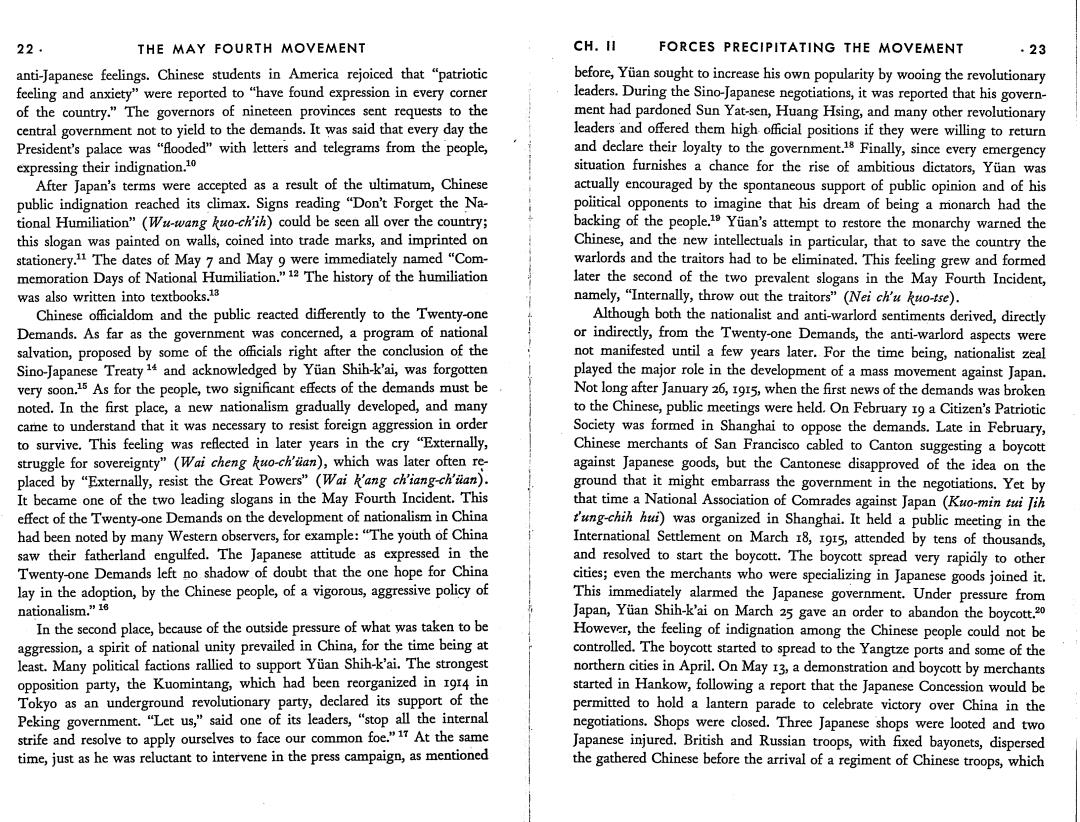
22, THE MAY FOURTH MOVEMENT CH.II FORCES PRECIPITATING THE MOVEMENT ·23 anti-Japanese feelings.Chinese students in America rejoiced that "patriotic before,Yuan sought to increase his own popularity by wooing the revolutionary feeling and anxiety"were reported to "have found expression in every corner leaders.During the Sino-Japanese negotiations,it was reported that his govern- of the country."The governors of nineteen provinces sent requests to the ment had pardoned Sun Yat-sen,Huang Hsing,and many other revolutionary central government not to yield to the demands.It was said that every day the leaders and offered them high official positions if they were willing to return President's palace was "flooded"with letters and telegrams from the people, and declare their loyalty to the government Finally,since every emergency expressing their indignation. situation furnishes a chance for the rise of ambitious dictators,Yuan was After Japan's terms were accepted as a result of the ultimatum,Chinese actually encouraged by the spontaneous support of public opinion and of his public indignation reached its climax.Signs reading "Don't Forget the Na- political opponents to imagine that his dream of being a monarch had the tional Humiliation"(Wi-wang kuo-ch'ih)could be seen all over the country; backing of the people Yian's attempt to restore the monarchy warned the this slogan was painted on walls,coined into trade marks,and imprinted on Chinese,and the new intellectuals in particular,that to save the country the stationery.41 The dates of May 7 and May 9 were immediately named "Com- warlords and the traitors had to be eliminated.This feeling grew and formed memoration Days of National Humiliation."The history of the humiliation later the second of the two prevalent slogans in the May Fourth Incident, was also written into textbooks.18 namely,"Internally,throw out the traitors"(Nei ch'u kuo-tse). Chinese officialdom and the public reacted differently to the Twenty-one Although both the nationalist and anti-warlord sentiments derived,directly Demands.As far as the government was concerned,a program of national or indirectly,from the Twenty-one Demands,the anti-warlord aspects were salvation,proposed by some of the officials right after the conclusion of the not manifested until a few years later.For the time being,nationalist zeal Sino-Japanese Treaty and acknowledged by Yuan Shih-k'ai,was forgotten played the major role in the development of a mass movement against Japan. very soon5 As for the people,two significant effects of the demands must be Not long after January 26,195,when the first news of the demands was broken noted.In the first place,a new nationalism gradually developed,and many to the Chinese,public meetings were held.On February a Citizen's Patriotic came to understand that it was necessary to resist foreign aggression in order Society was formed in Shanghai to oppose the demands.Late in February, to survive.This feeling was reflected in later years in the cry "Externally, Chinese merchants of San Francisco cabled to Canton suggesting a boycott struggle for sovereignty"(Wai cheng kuo-ch'tan),which was later often re- against Japanese goods,but the Cantonese disapproved of the idea on the placed by "Externally,resist the Great Powers"(Wai k'ang ch'iang-ch'tan). ground that it might embarrass the government in the negotiations.Yet by It became one of the two leading slogans in the May Fourth Incident.This that time a National Association of Comrades against Japan (Kuo-mintti Jih effect of the Twenty-one Demands on the development of nationalism in China t'ung-chihh)was organized in Shanghai.It held a public meeting in the had been noted by many Western observers,for example:"The youth of China International Settlement on March 18,195,attended by tens of thousands, saw their fatherland engulfed.The Japanese attitude as expressed in the and resolved to start the boycott.The boycott spread very rapidly to other Twenty-one Demands left no shadow of doubt that the one hope for China cities;even the merchants who were specializing in Japanese goods joined it. lay in the adoption,by the Chinese people,of a vigorous,aggressive policy of This immediately alarmed the Japanese government.Under pressure from nationalism.”8 Japan,Yuian Shih-k'ai on March 25 gave an order to abandon the boycott.20 In the second place,because of the outside pressure of what was taken to be However,the feeling of indignation among the Chinese people could not be aggression,a spirit of national unity prevailed in China,for the time being at controlled.The boycott started to spread to the Yangtze ports and some of the least.Many political factions rallied to support Yuan Shih-k'ai.The strongest northern cities in April.On May 13,a demonstration and boycott by merchants opposition party,the Kuomintang,which had been reorganized in 19r4 in started in Hankow,following a report that the Japanese Concession would be Tokyo as an underground revolutionary party,declared its support of the permitted to hold a lantern parade to celebrate victory over China in the Peking government."Let us,"said one of its leaders,"stop all the internal negotiations.Shops were closed.Three Japanese shops were looted and two strife and resolve to apply ourselves to face our common foe."At the same Japanese injured.British and Russian troops,with fixed bayonets,dispersed time,just as he was reluctant to intervene in the press campaign,as mentioned the gathered Chinese before the arrival of a regiment of Chinese troops,which
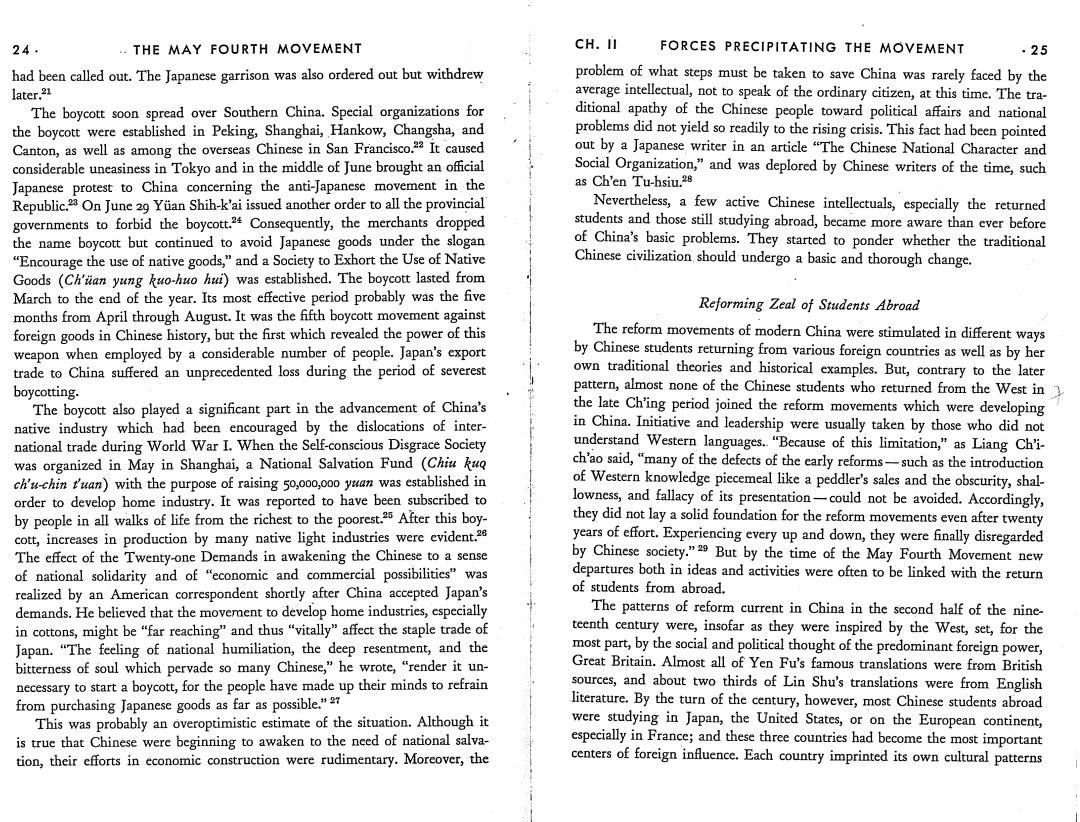
24+ .THE MAY FOURTH MOVEMENT CH.II FORCES PRECIPITATING THE MOVEMENT ·25 had been called out.The Japanese garrison was also ordered out but withdrew problem of what steps must be taken to save China was rarely faced by the later.21 average intellectual,not to speak of the ordinary citizen,at this time.The tra- The boycott soon spread over Southern China.Special organizations for ditional apathy of the Chinese people toward political affairs and national the boycott were established in Peking,Shanghai,Hankow,Changsha,and problems did not yield so readily to the rising crisis.This fact had been pointed Canton,as well as among the overseas Chinese in San Francisco.It caused out by a Japanese writer in an article "The Chinese National Character and considerable uneasiness in Tokyo and in the middle of June brought an official Social Organization,"and was deplored by Chinese writers of the time,such Japanese protest to China concerning the anti-Japanese movement in the as Ch'en Tu-hsiu.28 Republic.28 On June 29 Yuian Shih-k'ai issued another order to all the provincial Nevertheless,a few active Chinese intellectuals,especially the returned governments to forbid the boycott.2 Consequently,the merchants dropped students and those still studying abroad,became more aware than ever before the name boycott but continued to avoid Japanese goods under the slogan of China's basic problems.They started to ponder whether the traditional "Encourage the use of native goods,"and a Society to Exhort the Use of Native Chinese civilization should undergo a basic and thorough change. Goods (Ch'tan yung kuo-huo hui)was established.The boycott lasted from March to the end of the year.Its most effective period probably was the five Reforming Zeal of Students Abroad months from April through August.It was the fifth boycott movement against foreign goods in Chinese history,but the first which revealed the power of this The reform movements of modern China were stimulated in different ways weapon when employed by a considerable number of people.Japan's export by Chinese students returning from various foreign countries as well as by her trade to China suffered an unprecedented loss during the period of severest own traditional theories and historical examples.But,contrary to the later boycotting. pattern,almost none of the Chinese students who returned from the West in The boycott also played a significant part in the advancement of China's the late Ch'ing period joined the reform movements which were developing native industry which had been encouraged by the dislocations of inter- in China.Initiative and leadership were usually taken by those who did not national trade during World War I.When the Self-conscious Disgrace Society understand Western languages."Because of this limitation,"as Liang Ch'i- was organized in May in Shanghai,a National Salvation Fund (Chite ko ch'ao said,"many of the defects of the early reforms-such as the introduction ch't-chin t'uan)with the purpose of raising 50,000,000 yuan was established in of Western knowledge piecemeal like a peddler's sales and the obscurity,shal- order to develop home industry.It was reported to have been subscribed to lowness,and fallacy of its presentation-could not be avoided.Accordingly, by people in all walks of life from the richest to the poorest.25 After this boy- they did not lay a solid foundation for the reform movements even after twenty cott,increases in production by many native light industries were evident.?28 years of effort.Experiencing every up and down,they were finally disregarded The effect of the Twenty-one Demands in awakening the Chinese to a sense by Chinese society."29 But by the time of the May Fourth Movement new of national solidarity and of "economic and commercial possibilities"was departures both in ideas and activities were often to be linked with the return realized by an American correspondent shortly after China accepted Japan's of students from abroad. demands.He believed that the movement to develop home industries,especially The patterns of reform current in China in the second half of the nine- in cottons,might be“far reaching”and thus“vitally”affect the staple trade of teenth century were,insofar as they were inspired by the West,set,for the Japan."The feeling of national humiliation,the deep resentment,and the most part,by the social and political thought of the predominant foreign power, bitterness of soul which pervade so many Chinese,"he wrote,"render it un- Great Britain.Almost all of Yen Fu's famous translations were from British necessary to start a boycott,for the people have made up their minds to refrain sources,and about two thirds of Lin Shu's translations were from English from purchasing Japanese goods as far as possible literature.By the turn of the century,however,most Chinese students abroad This was probably an overoptimistic estimate of the situation.Although it were studying in Japan,the United States,or on the European continent, is true that Chinese were beginning to awaken to the need of national salva- especially in France;and these three countries had become the most important tion,their efforts in economic construction were rudimentary.Moreover,the centers of foreign influence.Each country imprinted its own cultural patterns
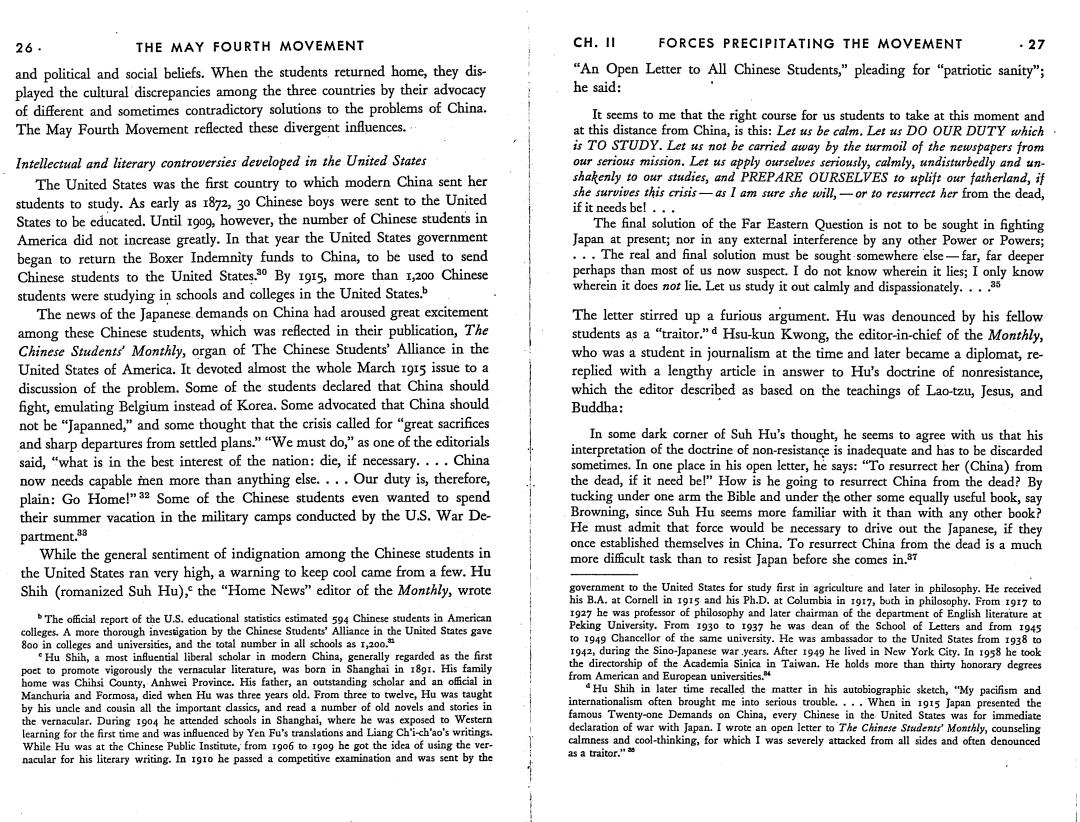
26· THE MAY FOURTH MOVEMENT CH.II FORCES PRECIPITATING THE MOVEMENT .27 and political and social beliefs.When the students returned home,they dis- "An Open Letter to All Chinese Students,"pleading for "patriotic sanity"; played the cultural discrepancies among the three countries by their advocacy he said: of different and sometimes contradictory solutions to the problems of China. It scems to me that the right course for us students to take at this moment and The May Fourth Movement reflected these divergent influences. at this distance from China,is this:Let us be calm.Let us DO OUR DUTY which is TO STUDY.Let us not be carried away by the turmoil of the newspapers from Intellectual and literary controversies developed in the United States our serious mission.Let us apply ourselves seriously,calmly,undisturbedly and un- The United States was the first country to which modern China sent her shakenly to our studies,and PREPARE OURSELVES to uplift our fatherland,if students to study.As early as 1872,30 Chinese boys were sent to the United she survives this crisis-as I am sure she will,-or to resurrect her from the dead, if it needs bel... States to be cducated.Until 1gog,however,the number of Chinese students in The final solution of the Far Eastern Question is not to be sought in fighting America did not increase greatly.In that year the United States government Japan at present;nor in any external interference by any other Power or Powers; began to return the Boxer Indemnity funds to China,to be used to send ..The real and final solution must be sought-somewhere else-far,far deeper Chinese students to the United States.3 By I9I5,more than I,200 Chinese perhaps than most of us now suspect.I do not know wherein it lies;I only know students were studying in schools and colleges in the United States.b wherein it docs noz lie.Let us study it out calmly and dispassionately...as The news of the Japanese demands on China had aroused great excitement The letter stirred up a furious argument.Hu was denounced by his fellow among these Chinese students,which was reflected in their publication,The students as a "traitor."d Hsu-kun Kwong,the editor-in-chief of the Monthly, Chinese Students'Monthly,organ of The Chinese Students'Alliance in the who was a student in journalism at the time and later became a diplomat,re- United States of America.It devoted almost the whole March rgI5 issue to a replied with a lengthy article in answer to Hu's doctrine of nonresistance, discussion of the problem.Some of the students declared that China should which the editor described as based on the teachings of Lao-tzu,Jesus,and fight,emulating Belgium instead of Korea.Some advocated that China should Buddha: not be "Japanned,"and some thought that the crisis called for "great sacrifices and sharp departures from settled plans.""We must do,"as one of the editorials In some dark corner of Suh Hu's thought,he seems to agree with us that his interpretation of the doctrine of non-resistance is inadequate and has to be discarded said,"what is in the best interest of the nation:die,if necessary....China sometimes.In one place in his open letter,he says:"To resurrect her (China)from now needs capable mnen more than anything else....Our duty is,therefore, the dead,if it need be!"How is he going to resurrect China from the dead?By plain:Go Home!"32 Some of the Chinese students even wanted to spend tucking under one arm the Bible and under the other some equally useful book,say their summer vacation in the military camps conducted by the U.S.War De- Browning,since Suh Hu seems more familiar with it than with any other book? partment.38 He must admit that force would be necessary to drive out the Japanese,if they once established themselves in China.To resurrect China from the dead is a much While the general sentiment of indignation among the Chinese students in more difficult task than to resist Japan before she comes in.37 the United States ran very high,a warning to keep cool came from a few.Hu Shih (romanized Suh Hu),the "Home News"editor of the Monthly,wrote government to the United States for study first in agriculture and later in philosophy.He received his B.A.at Cornell in 1915 and his Ph.D.at Columbia in 197,buth in philosophy.From 197 to The official report of the U.S.educational statistics estimated 594 Chinese students in American 1927 he was professor of philosophy and later chairman of the department of English literature at colleges.A more thorough investigation by the Chinese Students'Alliance in the United States gave Peking University.From 1930 to 1937 he was dean of the School of Letters and from 1945 80 in colleges and universities,and the total number in all schools as,00. to 1949 Chancellor of the same university.He was ambassador to the United States from 1938 to Hu Shih,a most influential liberal scholar in modern China,generally regarded as the first 1942,during the Sino-Japanese war years.After 1949 he lived in New York City.In 1958 he took poct to promote vigorously the vernacular literature,was born in Shanghai in 1891.His family the directorship of the Academia Sinica in Taiwan.He holds more than thirty honorary degrees home was Chihsi County,Anhwei Province.His father,an outstanding scholar and an official in from American and European universities. Manchuria and Formosa,died when Hu was three years old.From three to twelve,Hu was taught Hu Shih in later time recalled the matter in his autobiographic sketch,"My pacifism and by his uncle and cousin all the important classics,and read a number of old novels and stories in internationalism often brought me into serious trouble....When in 1915 Japan presented the the vernacular.During 1904 he attended schools in Shanghai,where he was exposed to Western famous Twenty-one Demands on China,every Chinese in the United States was for immediate learning for the first time and was influenced by Yen Fu's translations and Liang Ch'i-ch'ao's writings. declaration of war with Japan.I wrote an open letter to The Chinese Students'Monthly,counseling While Hu was at the Chinese Publie Institute,from Igo6 to Igog he got the idea of using the ver- calmness and cool-thinking,for which I was severely attacked from all sides and often denounced nacular for his literary writing.In i9ro he passed a competitive examination and was sent by the as a traitor